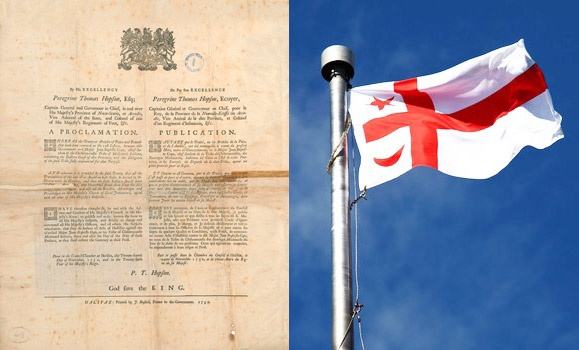News
» Go to news mainModern misconceptions on treaty rights

 To mark Treaty Day on October 1, Professor Constance MacIntosh spoke to Dal News about the importance of the Peace and Friendship Treaties today and some common misconceptions about treaty rights and her hopes for more meaningful partnerships in the future.
To mark Treaty Day on October 1, Professor Constance MacIntosh spoke to Dal News about the importance of the Peace and Friendship Treaties today and some common misconceptions about treaty rights and her hopes for more meaningful partnerships in the future.
Professor MacIntosh is Viscount Bennett Professor of Law and has taught and researched issues of Indigenous and Aboriginal law and governance since joining Dal in 2003 after years of working as a litigator on claims around the constitutional rights of Indigenous peoples.
When the Sipekne'katik First Nation of Nova Scotia launched its own Mi'kmaq-run, rights-based lobster fishery in St. Mary's Bay in September, non-Indigenous fishery workers in the region protested — some going so far as to cut traps and pull them from the water.
At the heart of the dispute is whether the fishery abides by the Sipekne'katik right to hunt, fish and gather in pursuit of a “moderate livelihood,” something enshrined in the Peace and Friendship Treaties signed in the 1700s and affirmed in a Supreme Court of Canada ruling 21 years ago. The Sipekne’katik affirm it does; some fishers disagree.
Because the Supreme Court’s decision did not define “moderate livelihood,” and a later clarification of its ruling noted that the federal government can still regulate Indigenous fisheries if “conservation” is a concern, some of the 34 Mi'kmaq and Wolastoqiyik First Nations across the Maritime provinces and Quebec's Gaspe region affected by the ruling are left with some uncertainty of how to exercise those treaty rights safely. Only three bands so far have official “moderate livelihood” agreements with the federal government.
Over the course of several decades in the 18th century, Britain signed a series of treaties with various First Nations in this region, including the Mi'kmaq. What is important for people to know about the Peace and Friendship Treaties?
Context is key, which is that these treaties were entered into centuries ago at a time when the Mi’kmaq people could have chosen to go to all-out war with all Europeans, but they chose not to. Instead, they chose to negotiate terms by which everyone could live in the area in peace and in security. The 1752 agreement, the one that is in the press so much right now, was specifically about the Mi’kmaq agreeing to cease any hostilities against British settlers in exchange for a number of promises, including respecting the Mi’kmaq right to trade. The British and the French came and they both wanted their people here, and the Mi’kmaq chose to form a partnership with the British instead of giving a back door for the French to get back in. If they had chosen differently, then I think our history could have been quite different. So these agreements are quite monumental for setting the course of history in this part of Canada.
What is the biggest misconception people seem to have about treaty rights today and how has that impacted broader efforts around reconciliation?
You mentioned that some fishers don’t believe the 1752 treaty includes that right to fish for moderate livelihood, which is a reasonable level of economic prosperity from natural resources. That view directly contradicts Canadian law. There’s a real problem with education about treaties in Canada. I’m not surprised people have such misconceptions. Treaties are a part of the Canadian Constitution, they are binding legal instruments, they are not discretionary. And they set out obligations on each side, which binds both parties. Just because one side hasn’t always kept their side of the bargain doesn’t result in the bargain becoming unenforceable or invalid. So my first point is that I think that as long as people fail to understand that treaties are actually a part of the Canadian Constitution, a part of the fabric of our country, that reconciliation isn’t really possible.
The second thing I want to raise is that another really common misconception, that I think undermines reconciliation, is this belief that treaty rights are some form of unregulated free for all. But that’s just not true. The Mi’kmaq fishery is closely regulated by Mi’kmaq First Nations and they create reasonable limits on catches. With the current one, I think it’s about 50 traps a fisher, with a very limited number of licenses. They have their own systems for enforcement. It’s by no means a free for all. I think that this misconception ties in with an even deeper one, which is that many non-Indigenous Canadians don’t realize First Nations have their own governments and that these governments take their responsibilities seriously. One of those responsibilities is specifically to regulate how their members practice treaty rights so that they can be practiced long into the future. When a treaty right is recognized, it is to be practiced pursuant to the authority and rules of the community.
The phrase ‘We are all Treaty People’ has been adopted fairly widely in organizations across Canada. What does this phrase signify exactly and why is it important?
One of the other misconceptions about treaties is that they are just about Indigenous people, but of course treaties need to be signed by more than one party. These are signed by Indigenous peoples and Europeans or Canadians as a framework for rights and obligations. The phrase is a reminder that non-Indigenous people benefit enormously from treaties. I think the phrase is used in part to try to educate people about our past and obligations for the future. And it’s a reminder that we are all in this together.
Other Mi’kmaq-run fisheries are expected to launch in the coming weeks around Nova Scotia. What changes do you hope to see arise in treaty relations as a result of all this activity?
In the short term, I’m really hopeful that we’ll see the rule of law being upheld. That any sort of wrongful interference with the Mi’kmaq around the fisheries pursuant to their treaty rights will cease. In the longer term, I’m hopeful that this is going to spawn a more meaningful partnership between fisheries officials and Mi’kmaq representatives that takes treaty rights more seriously. Part of why communities are acting unilaterally now is because they’ve been waiting for 21 years for the federal government to work with them on implementing the 1752 treaty rights after the Supreme Court of Canada decided that they had a right, among other things, to fish for an income. When you think about that, that is an enormous amount of lost income and opportunity. Twenty-one years can be a person’s whole lifetime from being born to becoming a young adult. If we just think about what that sort of income infusion could have done for Mi’kmaq peoples, in terms of enhancing their own communities, lives, well-being and self-sufficiency. I think that the Mi’kmaq have actually been incredibly patient. I’m somewhat surprised that this hasn’t been happening on a larger scale before. I’m hopeful that this will lead into much more transparent and meaningful dialogue about the best way for the treaty right to be practiced.
Recent News
- Professor Emeritus Wayne MacKay ft in "Legal columnist Wayne MacKay looks at tough‑on‑crime campaign promises"
- Professor Emeritus Wayne MacKay ft in "A closer look at "tough on crime""
- Associate Professor Naiomi Metallic ft in "Opinion: Indigenous issues absent in federal election"
- �鶹��ý Legal Aid Service ft in "�鶹��ý Legal Aid urges vigilance as stricter deadlines for tenants are put in place"
- Professor Matthew Herder ft in "Canadians could lose vital safety information amid deep cuts to the U.S. FDA, experts warn"
- Professor Kim Brooks ft in "Opinion: Trump’s freeze on national research funding an in for Canada"
- Associate Professor Michael Karanicolas ft in "Lawyers say Advocates' Society needs reform after org cancels event amid keynote speaker backlash"
- Professor Emeritus Wayne MacKay ft in "Nova Scotia moving to modernize traffic safety protocols"
